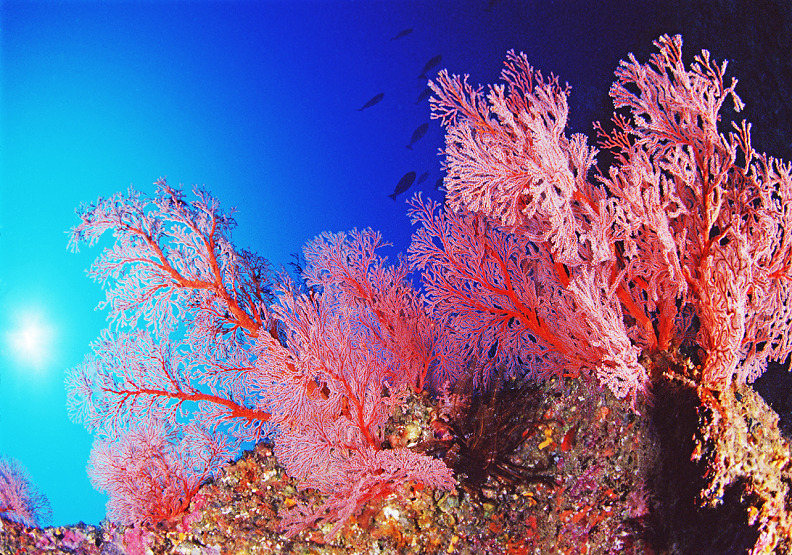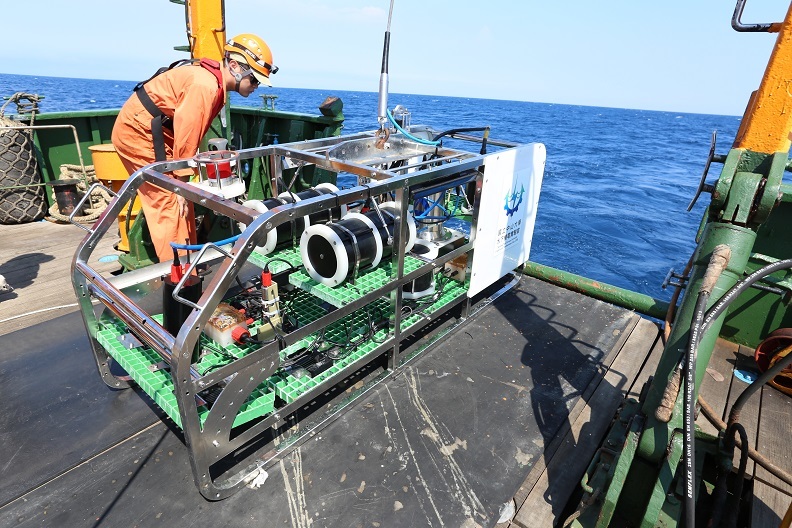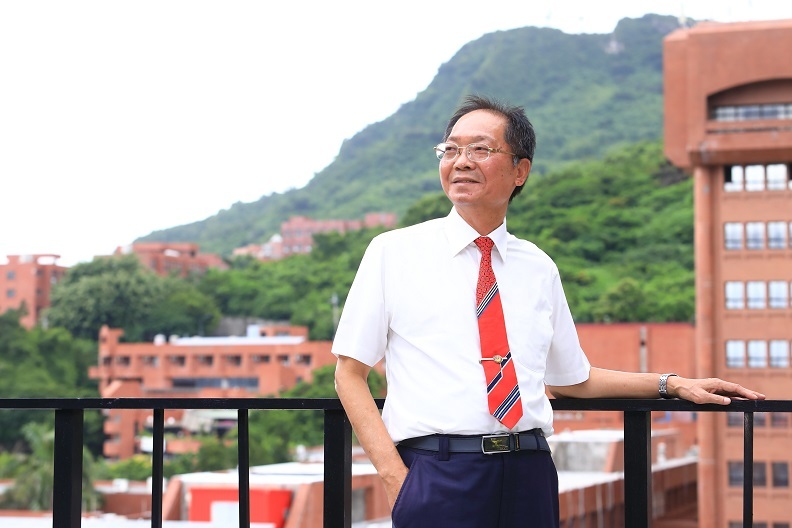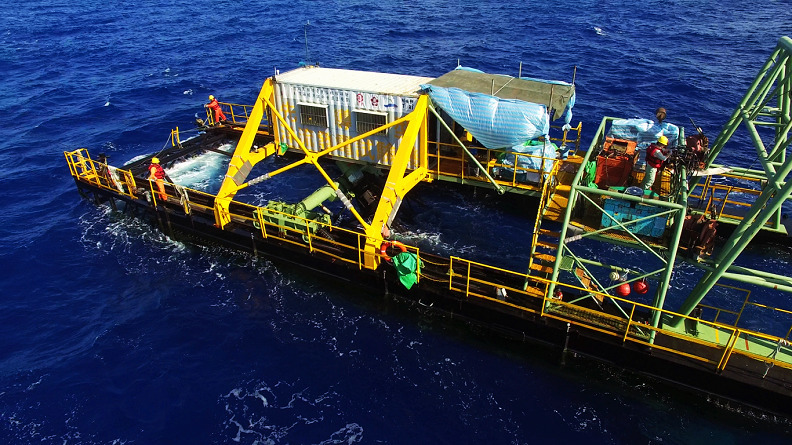NSYSU cultivates versatile professionals for marine economy (by Global Views Monthly)




Waters cover 70% of the Earth’s surface and hide organisms and resources of various shapes and colors. Taiwan is surrounded by waters and in recent decades the ocean is being increasingly exploited: from the earlier construction of ports, coastline conservation to the steady development of such new fields as underwater resource exploration and the engineering of offshore wind power generation. Since its establishment, the College of Marine Sciences at NSYSU has been a hub for the cultivation of versatile professionals in marine sciences, biotechnology, marine environment, engineering technology, coastline governance, and marine affairs.
Kaohsiung is the world’s third largest container port, and Taiwan’s largest distant-water fishing harbor, and thus, when NSYSU was established in 1980, marine sciences were one of the focal points for its development. This is how the College of Marine Sciences was established in 1986.
“There have already been great changes in marine research in Taiwan in the past few decades; first, port infrastructure and fishing resources development were the focus, later, such fields as coastline conservation and marine biology research. Now, we are getting deeper into the ocean, concentrating on the use of natural marine economy and offshore wind power generation; the ocean has become a driving force of the Taiwanese economy.” Chair Professor Yang-Yih Chen, whose background is in marine environment engineering, pointed out the steps in the progress of the development of marine sciences in recent decades in Taiwan.
Research on underwater vehicles to explore the depths of the ocean
The Institute of Undersea Technology at NSYSU is researching undersea vehicles with the support of the Ministry of Science and Technology and succeeded in creating the first unmanned submarine able to operate in a strong current in 2006. The development of deep-sea vehicles has become a highlight among science and technology projects in Taiwan. The unmanned submarine developed at NSYSU broke the operating depth record of the underwater vehicles developed autonomously in Taiwan and solved the problem of maintenance and need for upgrading the deep-sea exploration vehicles and equipment acquired abroad. What is more, NSYSU established the Underwater Vehicle R&D Center, dedicated to cross-disciplinary integration of domestic organizations related to marine technology into the Manned Submersible Development Alliance, which challenges autonomous R&D of manned vehicles for the exploration of the waters around Taiwan. The research of methane hydrate (methane ice) and the study of the hidden potential of the seabed mineral resources is expected to cause a rise of the domestic underwater industry chain, underwater studies of offshore wind power generation plants, maintenance, and national submarine R&D projects.
“The development of underwater vehicles requires various high-end technologies, such as sonar systems, underwater acoustic technologies, that not only can be applied in underwater communication, positioning, monitoring but are also strictly connected with national defense vessels policies and indispensable underwater monitoring technologies for the offshore wind power industry.”
Chair Professor Chen pointed out that the development of offshore wind power generation plants at the present stage of implementation of national policies requires a large number of professionals of different fields, for the preparation stage: environmental impact assessment, underwater monitoring, and wind farm projects, the construction stage: marine engineering, construction and installation of wind farm components, and later – wind farm operation, maintenance, and localization. The Department of Marine Environment and Engineering has been cooperating with domestic and overseas exemplar engineering consulting and construction companies, including CSBC Corporation and China Steel Corporation, to provide scholarship opportunities and conducting international research projects and student exchange with the Ghent University in Belgium to combine theory with practice. In 2020, NSYSU established the Master's Program in Offshore Wind Power and Maritime Engineering, integrating theory with the newest development trends of the industry, and employing professors to teach construction technologies for the offshore wind power generation industry and to educate professionals most needed by the industry.
Circular economy for sustainable ocean
The concept of circular economy has been maturing in recent years and has become incorporated into the policy put forward by different governments to attain sustainable development in the environment. Every country in the world is actively developing renewable energy sources. In the case of Taiwan, the best form of renewable energy is marine energy. The team led by Chair Professor Chen succeeded in the construction of a mooring system 900 m deep in the ocean with a floating platform, the first of such kind in Taiwan. The power generator is driven by a water flow of 0.45 m/s speed and can operate for up to 60 h continuously; it is the first system in the world to exploit the power generation potential of Kuroshio Current.
“The circular economy concentrates on increasing the percentage of energy obtained with renewable energy sources, reducing gas emissions, improving the efficiency of resource use, and caring for the sustainability of the environment while promoting economic development.” The College of Marine Sciences, with its three departments, two institutes, and one program, puts an emphasis on the concept of circular economy. Chen said that offshore wind and marine current power generation and research in marine biotechnology all apply the concept of sustainable use of resources and ecosystem protection.
In 2015, the research team of the Department of Marine Biotechnology and Resources working on marine biotechnology started cooperating with the National Museum of Marine Biology and Aquarium in Checheng, and succeeded in artificial breeding of soft corals. The tests on animals proved the efficiency of the coral extract in treating wounds, including burn wounds, atopic eczema, and diabetic wounds. Active substances in coral can also be used in skincare products: skin masks made of artificially-bred coral are greatly popular.
Seaweed, fish, corals, and even bottom mud bacteria are a treasure for the development of new drugs. In the past, they were difficult to obtain, however now, sample collection is easier with NSYSU’s R/V New Ocean Researcher 3. Now NSYSU is collaborating with the Kaohsiung Medical University and providing extractants for research in cancer, antiviral and antibacterial drugs. Research achievements attained over the years have been cited by various research organizations all over the world, positioning NSYSU as the 4th best university in Taiwan in research on natural marine products, and injecting new energy into domestic biotechnology development. This year, the international-level research vessel – R/V New Ocean Researcher 3 replaced its predecessor and will be used for future marine research.
Cultivating versatile talents in marine sciences
“The development of marine sciences is steadily progressing. Engineers in other countries have been steadily developing energy sources further from the coast and deeper into the sea. NSYSU established the Institute of Undersea Technology in 1996, integrating such fields as mechanics, electro-mechanics, optoelectronics, information technology, and artificial intelligence; its research achievements are comparable with the European level”, said Professor Chen. He said that marine research at NSYSU not only covers undersea technology – a very popular field at the moment, offshore wind power generation, research in marine biomedicine but also, the Department of Oceanography is working on the conservation of the marine ecosystem, the Graduate Institute of Marine Affairs cultivates professionals to shape the marine policy and serve in the industry; the College of Marine Sciences also offers a professional program in advanced underwater cultural heritage and international fishery industry management, and the Doctoral Degree Program in Marine Biotechnology in collaboration with Academia Sinica to develop marine biotechnology for application in the industry and create a hub for the cultivation of professionals in the marine industry.
Article in Global Views Monthly (Chinese version): https://www.gvm.com.tw/article/74504
